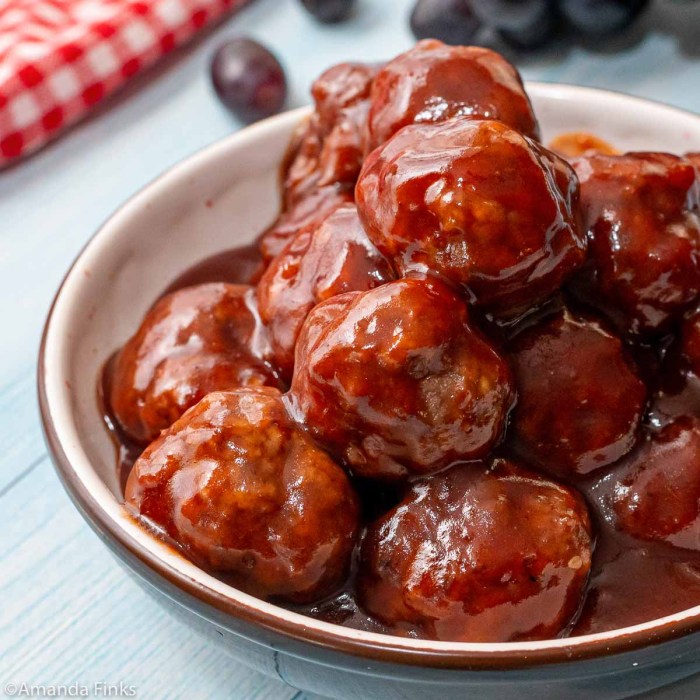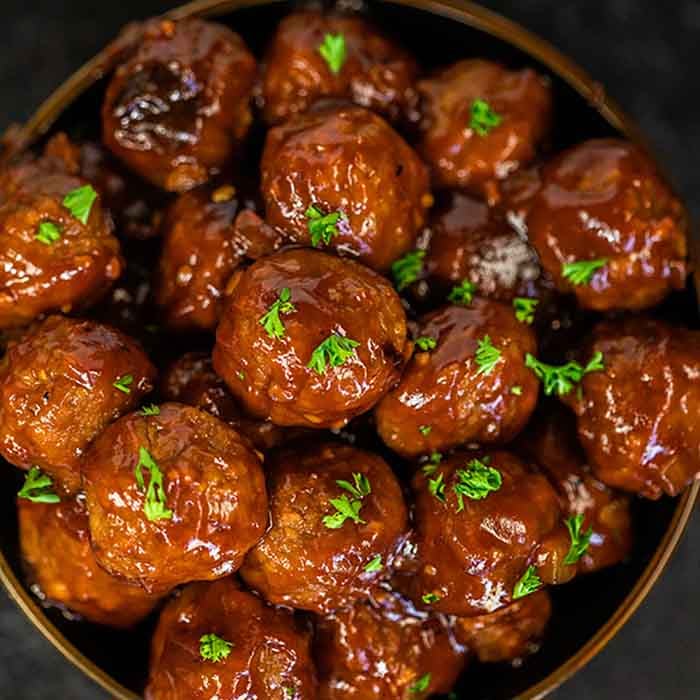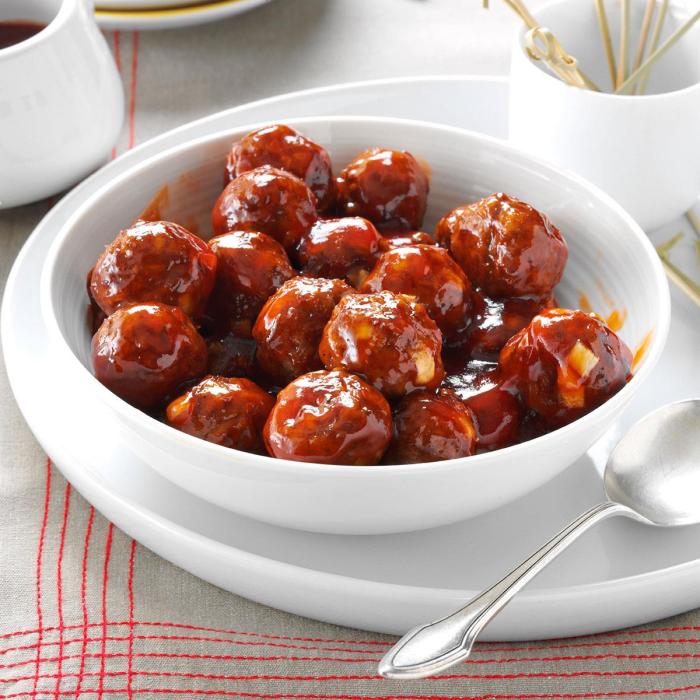BBQ Meatball Sauce Recipe A Flavorful Guide
BBQ Meatball Sauce: A Flavorful Fusion: Bbq Meatball Sauce Recipe
Bbq meatball sauce recipe – Barbecue sauce, a culinary cornerstone of American cuisine, boasts a rich history evolving from simple vinegar-based sauces to the diverse range we see today. Its versatility shines through in its many forms, each characterized by unique flavor profiles and textures. The marriage of BBQ sauce with meatballs creates a harmonious blend of sweet, savory, and smoky notes, resulting in a dish that’s both comforting and exciting.
BBQ Sauce History and Variations
The origins of BBQ sauce can be traced back to the early days of American settlers, who utilized readily available ingredients like vinegar and spices to preserve and flavor their meats. Over time, regional variations emerged, influenced by local ingredients and culinary traditions. The South, for instance, favored sweeter sauces, while the Carolinas developed mustard-based varieties. Today, we find everything from tangy tomato-based sauces to smoky, molasses-rich concoctions, each with its distinct character.
Key characteristics differentiating BBQ sauces include sweetness level, acidity, smokiness, and the dominant flavor profile (e.g., tomato, vinegar, mustard). The balance of these elements contributes to the overall taste and texture, creating a wide spectrum of options to suit diverse palates.
The appeal of BBQ sauce with meatballs lies in its ability to enhance the savory richness of the meatballs while adding a layer of complexity and depth. The sauce’s sweetness balances the meatiness, while its acidity cuts through the richness, creating a delightful culinary experience.
Sweet vs. Savory BBQ Meatball Sauce Recipes

Source: amandaseasyrecipes.com
Sweet and savory BBQ meatball sauces represent two distinct approaches to flavoring this classic dish. Sweet versions often incorporate brown sugar, molasses, or honey, resulting in a rich, caramelized flavor that complements the savory meatballs. Savory variations, on the other hand, emphasize the tanginess of vinegar, the depth of Worcestershire sauce, or the smokiness of chipotle peppers.
Sweet BBQ sauces typically include ingredients like ketchup, brown sugar, molasses, apple cider vinegar, and smoked paprika. These ingredients create a balanced sweetness and smokiness. Savory versions might utilize tomato paste, Worcestershire sauce, red wine vinegar, garlic, onion powder, and chili powder for a more robust and complex flavor profile.
The choice between sweet and savory depends on personal preference and the desired balance of flavors. A sweet sauce pairs beautifully with milder meatballs, while a savory sauce complements bolder, more robust meat options.
Exploring Sauce Base Ingredients
The foundation of any good BBQ sauce lies in its base ingredients, which significantly impact the final texture and flavor. Common base ingredients include ketchup, tomato paste, and vinegar, each contributing unique qualities to the sauce.
| Ingredient | Texture Impact | Flavor Profile | Suitable Meatball Type |
|---|---|---|---|
| Ketchup | Smooth, slightly thick | Sweet, tangy, tomato-forward | Mild Italian meatballs, turkey meatballs |
| Tomato Paste | Thick, rich | Umami-rich, savory, concentrated tomato | Beef meatballs, lamb meatballs |
| Vinegar (Apple Cider, Red Wine) | Thin, tangy | Acidic, bright, adds depth | Pork meatballs, chicken meatballs |
| Combination (Ketchup & Tomato Paste) | Balanced thickness, rich | Sweet and Savory, complex | Most meatball types |
Ketchup provides sweetness and a smooth texture, while tomato paste offers a deeper, more concentrated tomato flavor and a thicker consistency. Vinegar adds acidity and brightness, balancing the sweetness and richness of other ingredients. The choice of base ingredient depends on the desired flavor profile and texture of the final sauce.
A fantastic BBQ meatball sauce recipe often benefits from unexpected flavor pairings. For a unique twist, consider incorporating elements inspired by the tartness of a good cranberry sauce, perhaps even referencing Alex Guarnaschelli’s acclaimed approach as seen in her alex guarnaschelli cranberry sauce recipe for inspiration. This unexpected combination of sweet and savory can elevate your BBQ meatball sauce to a whole new level of deliciousness.
Flavor Boosters: Spices and Herbs

Source: eatingonadime.com
Spices and herbs play a crucial role in elevating the BBQ meatball sauce beyond the basic base ingredients. They add layers of complexity, depth, and nuance to the overall flavor profile.
- Smoky Sweet: Smoked paprika, brown sugar, chipotle powder, cumin
- Tangy Spicy: Cayenne pepper, garlic powder, onion powder, apple cider vinegar
- Savory & Herbaceous: Rosemary, thyme, oregano, Worcestershire sauce
- Sweet & Savory: Molasses, Dijon mustard, garlic, onion
Balancing sweetness, smokiness, and acidity is key to creating a well-rounded sauce. Sweetness can be adjusted with brown sugar or molasses, smokiness with smoked paprika or chipotle powder, and acidity with vinegar or lemon juice. Experimentation is encouraged to achieve the perfect balance for your palate.
Meatball Considerations
The type of meatball significantly influences the overall flavor and texture of the dish. Different meat blends offer diverse flavor profiles and textures, creating opportunities for customization.
Beef meatballs provide a rich, savory base, while pork meatballs offer a slightly sweeter and more tender texture. Turkey and chicken meatballs are leaner options, ideal for those seeking a lighter dish. Combining different meats can result in unique flavor profiles; for example, a blend of beef and pork creates a well-balanced meatball with both richness and tenderness.
- Use high-quality ground meat.
- Gently mix the meat to avoid overworking it.
- Add breadcrumbs or other binders to improve texture.
- Season generously with salt, pepper, and other desired spices.
- Don’t overcook the meatballs; aim for a juicy interior.
Cooking Methods and Sauce Preparation, Bbq meatball sauce recipe
Meatballs can be cooked using various methods, each affecting their texture and flavor. Baking yields tender meatballs, while pan-frying creates a flavorful crust. Grilling imparts a smoky char.
BBQ Meatball Sauce Preparation:
- Sauté onions and garlic in a saucepan until softened.
- Add your chosen base ingredients (ketchup, tomato paste, vinegar).
- Stir in your spices and herbs.
- Simmer the sauce over low heat for at least 15-20 minutes, allowing the flavors to meld.
- Adjust seasoning to taste.
- Thicken the sauce if needed by simmering uncovered for a longer time or adding a cornstarch slurry.
Achieving the desired consistency is crucial. A thicker sauce coats the meatballs well, while a thinner sauce provides a lighter glaze. Simmering the sauce for longer periods will naturally thicken it. Alternatively, a cornstarch slurry (cornstarch mixed with cold water) can be added to achieve the desired thickness.
Serving Suggestions and Pairings
BBQ meatballs are incredibly versatile and can be served in various ways, depending on the occasion and preference. They make excellent appetizers, satisfying main courses, or components of a larger meal.
Ideal side dishes complement the rich flavors of the meatballs and sauce. Consider serving them with:
- Coleslaw
- Potato salad
- Macaroni and cheese
- Grilled corn on the cob
- Roasted vegetables
Drinks that pair well with BBQ meatballs include:
- Craft beer (IPA, amber ale)
- Red wine (Zinfandel, Cabernet Sauvignon)
- Iced tea
- Lemonade
Visual Appeal of the Dish

Source: tmbi.com
The finished dish presents a visually appealing combination of textures and colors. The glossy, rich BBQ sauce coats the meatballs, creating a vibrant sheen. The meatballs themselves, depending on the meat blend, can range in color from deep brown to light reddish-brown. The overall aesthetic is one of warmth, richness, and comfort.
The visual appeal of the sauce ingredients is equally important. The deep red of the tomato paste, the amber hues of molasses, and the vibrant green of fresh herbs contribute to a visually enticing sauce. The contrast of colors and textures creates a dynamic and appealing presentation, enhancing the overall dining experience.
FAQ Overview
Can I make the sauce ahead of time?
Yes, the BBQ sauce can be made up to 3 days in advance and stored in the refrigerator. Its flavors will deepen over time.
What type of vinegar works best?
Apple cider vinegar and red wine vinegar are popular choices, offering different levels of sweetness and acidity.
Can I freeze the meatballs?
Yes, cooked meatballs can be frozen for up to 3 months. Allow them to cool completely before freezing.
What are some vegetarian/vegan alternatives?
Substitute ground meat with lentils, mushrooms, or a hearty vegetable mix. Adjust spices accordingly for optimal flavor.




















